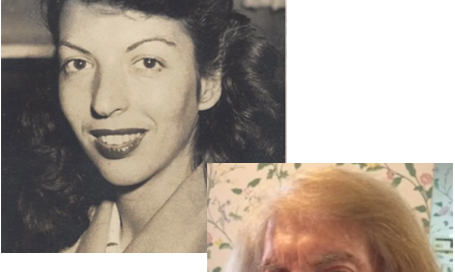LISTEN TO THE INTERVIEW ABOUT ELAINE WITH HOLLIE
“I always saw being a woman as an advantage. It made you stand out. I had my own way of doing things, and I’m pretty proud of that.”
Elaine Fischel
This week I am highlighting the work of two very prolific figures you probably won’t ever here or read about in mainstream news circles. But these are the sort of people who inspire me in my work, the type of stories and sources of inspiration, the sort of people who should be in the history books for leaving a mark on world, for standing up for true pillars of defense and democracy.
TOKYO TRIALS: MEET THE CALIFORNIA WOMAN WHO DEFENDED JAPANESE LEADERS
During the mourning, mayhem, and uncertainty following World War ll, a passionate 25-year-old legal secretary volunteered to leave her Southern California home to take on an unpopular project: representing some of Japan’s most heinous war criminals at what is known as the “Tokyo Trials.”
I had the pleasure of meeting this extraordinary woman, Elaine Fischel, in 2016 when she was 95. Over cups of tea in her Los Angeles home – dotted with pink curtains, black-and-white photographs holding her treasure chest of memories, and the unmistakably bittersweet scent of persimmons and the timeworn, musty books – she led me down history’s path. I was guided into the moments that ultimately determined the structure of all war crimes tribunals going forward.
It all began with a phone call that would forever change Elaine’s life.
“I was working for the Los Angeles District Attorney as a staff secretary, and I got this call from somebody I had known from when I worked in Washington, and he said, ‘You wanted to go to law school, so this would be a good experience,'” Elaine told me. “They said it would be just six months, but it turned out to go on for two-and-a-half years.”
As the Second World War drew to a close, the victorious Allied governments – the United States, United Kingdom, France, and the Soviet Union – established the first-ever international criminal tribunals to summon authorities for war crimes and other atrocities. To try individuals in Europe, the International Military Tribunal (IMT) was established in Nuremberg, Germany. To prosecute “Far Eastern war criminals,” the International Military Tribunal for the Far East (IMTFE) was founded in Tokyo, Japan.
The latter was a product of the Potsdam Declaration, signed in July 1945 by China, the United States, and Britain, which called for Japan’s “unconditional surrender” and mandated that “stern justice will be meted out to all war criminals.” Additionally, at the Moscow Conference in December 1945, the Soviet Union signed a basic outline for Japan’s postwar occupation.
Following Japan’s surrender, General MacArthur, as Supreme Commander of the Allied Powers, issued a proclamation that created the IMTFE and enabled him to appoint judges from the following countries: Australia, Canada, China, France, India, the Netherlands, Philippines, the Soviet Union, the United Kingdom, and the United States. All of these countries were to also have prosecution teams.
On April 29, 1946, those triumphant nations united to form the IMTFE. Within a month, the coalition began officially charging some 28 Japanese political and military leaders with “joint conspiracy to start and wage war” in addition to a number of war crimes. The crimes were broken down into three categories:
Class A: Charges against Japan’s top leaders for crimes against peace.
Class B and C: Charges against Japanese military personnel, of all ranks, for conventional war crimes and crimes against humanity.
In a haunting building once belonging to the Japanese Ministry of War, the trial lasted until November 1948. To prove the war crimes, the prosecution had to demonstrate three main elements: that the crimes were systematic and comprehensive, that the defendants were aware of the crimes committed by the troops, and that the accused had the ability to stop the criminal activity.
Defendants were represented by dozens of attorneys, with a quarter of them Americans. It was argued there was no consensus on what constituted a war crime, and that Tokyo acted in self-defense.
Originally, Elaine wanted to work for the prosecution, but was instead assigned to the defense. But for this wide-eyed and aspiring attorney, standing beside and representing the enemy presented an unusual challenge: advocating for the men who had orchestrated atrocities such as Pearl Harbor, the Rape of Nanking, and the atrocious torture and transfer of Filipino and American prisoners of war, known as the Bataan Death March.
It was perhaps ironic that her patriotic pride compelled her to take on such an unpopular assignment.
“The US didn’t want what they called vigilante justice – a ‘we’ll take ’em out and shoot ’em’ approach,” Elaine, who served as the official legal secretary, explained in earnest. “It was agreed to give them a proper trial.”
There is still a lingering notion of vigilante or “victors justice” in the foreign policy world today. This was the first large-scale international conflict during which the “victors” designed and successfully prosecuted and punished thousands of personnel in conquered nations for crimes against peace and humanity. However, in subsequent years, the prevailing theory has been that “winners” of war are often granted immunity for their crimes.
But Elaine’s persistence to stay the course was also driven by a desire to show her beloved homeland’s democratic roots.
“I wanted people to know that America is a great country,” she recalled. “We sent our lawyers there to defend the enemy, and I don’t think any other country would do that. To me, it was an example of the United States at its best.”
Since then, critics have framed the post-World War ll trials as a “show and tell” aimed at propagandizing the superiority of the Anglo-American judicial system and imposing western values. I was compelled to reason, however, from Elaine’s passionate manner and the conviction in her eyes, that she was firmly committed to the principle of “innocent until proven guilty,” and to ensure that every defendant is treated equally.
Yet, as Elaine got to know the men on trial, regarded as bold-faced killers by most Americans, she realized that there are not necessarily obvious characteristics that define a war criminal. Those who commit heinous wrongdoings in the war theater are also the everyday humans among us.
“It was hard to think of them as barbarians, as they were all so polite,” Elaine said, pausing with reflection. “But there were some very, very bad men on trial.”
Throughout the wartime years, Elaine – like many Americans – had developed intense hatred for the Japanese, whose forces she blamed for the deaths of many of her friends. Yet as Elaine became entangled in the personal lives of Japan’s disgraced leaders, her perceptions of the enemy began to change.
“I really thought the Japanese were horrible people,” she confessed. “The turning point was when the little 15-year-old daughter of one of the defendants came to me and asked if she could see her father.”
In that moment, Elaine realized that these men weren’t just malicious, but also wore the hat of being devoted fathers, husbands, and sons. Instead of viewing them as war criminals, the legal team saw them as clients. In the months that would become years, Elaine would send letters home, expressing clearly her growing respect and love for the Japanese people, their plight, and their cultural traditions.
Among the obligations of the legal assistant were to visit the prisoners in their cells and take down their requests. In the process, Elaine became close to General Hideki Tojo, the Prime Minister turned chief of the General Staff Office of the Imperial Japanese Army.
“He always wanted to see his lawyer, so he would often come up to me,” Elaine remembered. “I had also started horseback riding at the stable where his horses were, so he always asked about that.”
The mission of Tojo to “make Japan the world’s leader in that part of the world” was righteous, and Japan’s role in the war was one of self-defense.
“He really thought that he had acted to protect his country,” she said.
Elaine recounted that the mood in Tokyo was one of devastation and defeat, yet people were working tirelessly to rebuild: women and men planted seeds wherever there was soil, carried bricks on their shoulders for miles, and eventually became grateful to the Americans, who occupied Japan until 1952.
“They went out of their way to be nice to us,” she assured me. “No one was ever hurt or killed in the occupation, and there was no resentment.”
Elaine detailed the swanky soirees with Tokyo’s elite, where strict US rules forbade Americans from even nibbling at the hosts’ food, thus, to avoid the perception they were taking from the Japanese. She became an especially close friend and tennis partner of Emperor Hirohito’s younger brother and Navy captain, Prince Takamatsu.
Elaine also came to know well the military forces behind the Pearl Harbor attack, including Navy Capt. Yasuji Watanabe, the top aide to Yamamoto Isoroku, who was shot down by US forces in 1943.
“I could have stayed (in Japan) and gotten another job, but I knew it was an artificial home for an American,” she said. “We were important people, but in the real world, I was just another ordinary person who wanted to go to law school.”
On November 12, 1948, the tribunal adjourned. One defendant was deemed mentally unfit for trial, and charges were dropped; two died of natural causes during the process. Sixteen were given life sentences, three died during their incarceration, and the rest were pardoned and released in the mid-1950s.
But for the defendants, avoiding the noose represented a victory.
Shigetarō Shimada, chief of the Imperial Japanese Navy General Staff who was granted life but later released, wrote that if it weren’t for Elaine and the legal team, “he would be in heaven.”
Ultimately, not all were spared.
In a bleak, snow-covered December 23, 1948, day, General Tojo and six others were hanged at Sugamo prison. General MacArthur, afraid of inflaming or humiliating the Japanese, went against President Truman’s wishes and forbade any form of photography.
The Tokyo tribunal became a major catalyst for defining international criminal law, providing a template for future trials and leading to universal legislation.
Upon arriving home to sunny Southern California, Elaine was confronted with the changes her own country had undergone. Furthermore, her attempt to earn a law degree from the University of Southern California was rocky from the start.
“I had been gone (from America) for several years. The war was now over, and the United States had become this consumer nation, and we had all things we didn’t have before,” she noted. “Many of my friends in law school were already on the GI bill. I was no great scholar. I just wanted to get through.”
Elaine finally penned a book about her experience in Tokyo in 2010, titled “Defending the Enemy”.
“I was proud and happy to be associated with the defense,” she wrote. “Despite the bitterness, many of my countrymen felt about providing assistance to people who they considered barbaric murderers.”
After practicing law for sixty-one years, including criminal defense and personal injury, Elaine retired in 2015. She spent many years working as one of the few women in a field overwhelmingly dominated by men, but never felt adversely affected.
“I always saw being a woman as an advantage. It made you stand out,” she emphasized, reaching for my hand. “I had my own way of doing things, and I’m pretty proud of that.”
It was a chilled day in early 2017 when I left Elaine’s home for the last time, feeling grateful for being gifted her friendship. In soft peach-colored cardigans and twirling against the grain, Elaine was a woman who worked and played alone in a wide world in an era when women were not allowed to do so. But I loved Elaine for what she stood for: independent justice, unencumbered by the wars that defined her young adulthood.
Elaine did not marry or have children of her own. However, she was so deeply loved by many with her maternal, tender hands and strong will that radiated from her tiny frame.
I moved to New York and was packing my bags to go overseas on assignment when our mutual friend, Eric Gazin, who introduced us, texted to tell me Elaine had passed away. It was just over a week before her 96th birthday. On the tail end of a snowstorm, I wept on the hardwood floor.
“If you can do the work,” Elaine had once said to me over dinner, the afternoon sunshine pooling over her kind face. “You should do the work. And if you do the work, it will matter.”
Please follow and support my investigative/adventure/war zone work for LIBERTY DISPATCHES here: https://dispatch.libertyblockchain.com/author/holliemckay/
For those interested in learning more about the aftermath of war, please pick up a copy of my latest book “Only Cry for the Living: Memos from Inside the ISIS Battlefield.”
If you want to support small business:
And also now available Down Under!
My new coffee table book with the amazing photographer @JakeSimkinPhotos is additionally available for pre-order, slated for release later this Spring: Afghanistan: The End of the US Footprint and the Rise of the Taliban Rule
Thanks again for your support. Follow me on Instagram and Twitter for more updates. Please consider a paid subscription to help me continue to do this work.















Share this post